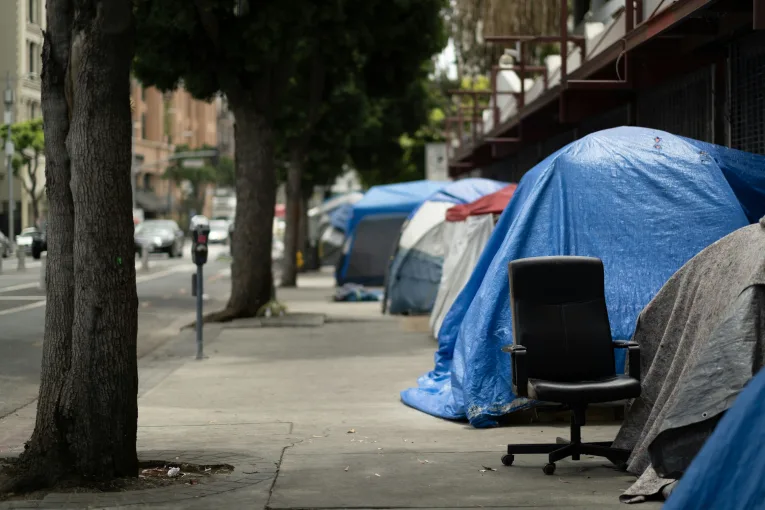
The Davis City Council last week approved their homeless encampment ordinance, again on a contested 3-2 vote. A key point here is that the city of Davis is going against what advocates of the homeless recommend.
As the Lawyers Committee For Civil Rights out of San Francisco noted last summer after the Grants Pass decision, “Allowing cities to cite and arrest unhoused people for sleeping outside will funnel vulnerable individuals into the criminal legal system. Even if they ultimately prevail in court, the damage will be done. Being arrested, or having a criminal record, warrant, or unpaid court fines can trap people in homelessness by making it more difficult for them to secure public benefits, employment, and permanent housing.”
“Cities should not punish people for being poor,” said Jennifer Friedenbach, executive director of the Coalition on Homelessness. “The solution is, and has always been, safe and affordable housing. But instead of tackling root causes, elected leaders have chosen to penalize residents who have nowhere else to go.”
Los Angeles Controller Kenneth Mejia noted, “Our own Office’s work was cited in the Grants Pass v. Johnson brief in support of unhoused peoples’ rights. The brief cited our Office’s finding that last year, there were only approximately 16,000 shelter beds but approximately 46,000 unhoused people in the City of LA.”
Mejia added, “If the City somehow managed to fill all 16,000 beds and the scant collection of other housing resources, where would the Supreme Court suggest the remaining tens of thousands of people go? For people who cannot afford our soaring rent prices, whose friends and family can’t support more people under their roof, who can’t access affordable health care, mental health support, or substance abuse support—there is nowhere for them to go but streets, sidewalks, parks, and other public spaces, where it is now illegal for them to be.”
This conversation is also playing out in Davis.
“Having a misdemeanor violation on someone’s record, that stays on their record and makes it more difficult to get into housing,” said Councilmember Donna Neville who opposed the plan twice. “We are trying to provide ways for people to get into housing, not make it more difficult for them to do so.”
Against that charge, Davis Police Chief Todd Henry clarified that his officers will not make arrests absent a threat to health or safety, or if a crime has been committed.
There are two problems with that approach. First, if that is the case, why would they need this law? If a crime has been committed or there are public safety threats, police already have the discretion to arrest.
Second, and more fundamentally, this amounts to a blank check of trust. Give us the power, but we won’t use it. It seems like Henry is following the policies so far that existed under his predecessor, Chief Darren Pytel. The problem is—what happens if someone comes in the future that changes that policy?
And, yes, the document is not fixed in stone, but we know from experience how difficult it is to change something that has been passed as opposed to changing something prior to passage.
There is another interesting caveat here—Linda Deos, councilmember-elect who will be sworn in next week, seemed to be more on the side of Neville than the side of outgoing Councilmember Will Arnold. And yet, Arnold is the one that made the motion that passed 3-2. There is nothing wrong with that per se, but perhaps it might have been wiser to allow the newly elected rather than the outgoing councilmember to weigh in.
Finally, I have a bone to pick with the notion that we already have services.
For example, Mayor Josh Chapman noted emails suggesting that “we as a council are not addressing the root causes of homelessness, which are affordable housing, mental health issues and social services.”
He then went on to list all of these “services” that supposedly help the unhoused. It’s an impressive list for sure, but hang on a second.
“As I heard people come in and talk about how we are lacking in all of these areas, I just thought to myself that I think that people just don’t know what we’re doing and don’t realize that all of those resources are out there and that we are doing that work,” said Councilmember Gloria Partida.
But here’s the problem. According to the Point in Time count, in 2024, there are 161 people without homes in Davis. However, at no point have there been 161 beds available. So with all of those services, we still don’t have enough beds.
I don’t want to disparage the services, but I guarantee if I reached out to people who work for these organizations they will admit first and foremost that we don’t have enough resources. And that’s the problem.
I’m not blaming this on the council, but, at the end of the day, if you want to justify a punitive approach based on availability of services, the first response has to be to point out we don’t have nearly enough. That’s the problem and unfortunately the bottom line.
